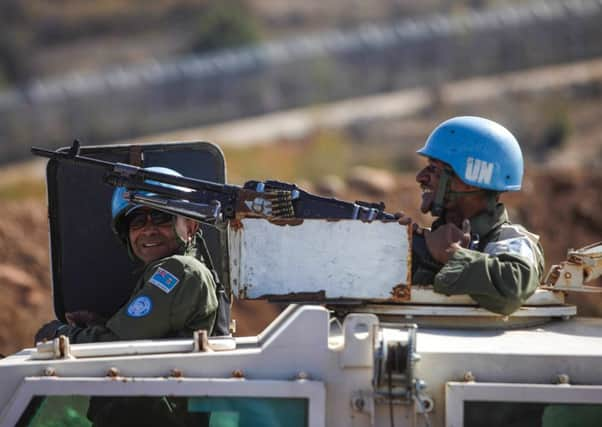Russians '˜find signs of chemical weapons' used by Syrian militants


Defence ministry spokesman Major General Igor Konashenkov said that ministry experts had found unexploded ordnance and fragments of munitions containing chlorine and white phosphorus on Aleppo’s south-western outskirts.
Maj-Gen Konashenkov said the discovery proved the militants had used chemical weapons against civilians and Syrian army soldiers.
Advertisement
Hide AdAdvertisement
Hide AdThe announcement comes as the Syrian government and Russia appear to be preparing for an all-out offensive on the besieged eastern parts of Aleppo that are held by opposition fighters.
Pro-Syrian media outlets in Lebanon have been reporting that heavy reinforcements have been arriving in Aleppo over the past weeks in preparation for the attack.
The Interfax news agency reported yesterday that jets from the Russian aircraft carrier Admiral Kuznetsov had been flying across Syria over the past few days to survey the area in preparation for future combat missions.
It said that preparations were under way for the carrier and escorting ships to launch strikes against militants.
The US and its allies have pushed for sanctions on the Syrian government for using chemical weapons.
However, Russia has questioned international investigators’ conclusions which have linked chemical weapons use to the Syrian government and pointed at evidence of their use by the militants.
The UN Security Council has voted to extend the mandate of inspectors working to determine those responsible for chemical weapons attacks in Syria.
Aleppo – Syria’s largest city and, at one time, its commercial capital – has been the centre of violence in recent months, with government forces besieging eastern rebel-held neighbourhoods.
Advertisement
Hide AdAdvertisement
Hide AdThe insurgents had seized a couple of strategic areas in western Aleppo since they launched an offensive on government-held parts of Aleppo on 28 October in an attempt to break the siege imposed on areas they have controlled since July.
The siege on eastern Aleppo was coupled with a punishing bombing campaign by Syrian aircraft and supported by Russia, which has been backing the government of president Bashar al-Assad.
Since late October, Russia said it would halt the airstrikes, amid rising civilian casualties.
Russian leaders have urged rebels to leave the territory.
Syrian troops launched a counteroffensive, capturing much of the southwestern areas they lost as well as parts of Al-Assad district, which is west of the city.
The Britain-based Syrian Observatory for Human Rights said warplanes carried out dozens of airstrikes on the western edge of Aleppo and nearby villages.
It added that government forces were trying to regain control of the remaining parts of Al-Assad district which are still under rebel control.
The Aleppo Media Centre, an activist collective, also reported intense airstrikes on Al-Assad district, as well as an airstrike on the nearby village of Kfar Dael, saying it left dozens of people killed or wounded.
On Thursday, Jan Egeland, the special adviser to the United Nations envoy for Syria, said the last food rations in besieged eastern Aleppo would run out by next week.
Speaking in Geneva, Mr Egeland said the last time that people inside east Aleppo received any humanitarian aid was at the beginning of July.